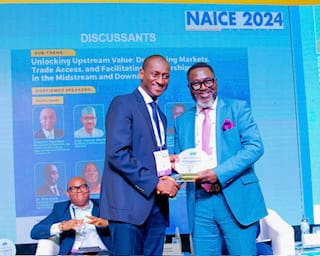Transportation Of Petroleum Products By Road Risky, Expensive — Heritage Energy …C0NTINUE READING HERE >>>
The General Manager (GM), Government Joint Ventures and External Relations of Heritage Energy, Sola Adebawo, has called for an overhaul of the country’s petroleum products transportation strategy to further reduce risks and associated costs.
Adebawo, who observed that 98 per cent of refined petroleum products within Nigeria are moved by road transportation, said that the pattern of product conveyance has led to high cost per unit volume and safety concerns.
He, therefore, challenged authorities to review the system and possibly find a solution to the trend.
The GM made the observation during a panel session, which he moderated, at the ongoing Nigeria Annual International Conference and Exhibition (NAICE) organised by the Society of Petroleum Engineers (Nigeria Council), on Tuesday, August 6, 2024, in Lagos.
The panel, which was titled: ‘Unlocking upstream value: developing markets, trade access and facilitating partnerships in the midstream and downstream’, featured seasoned industry professionals.
They included Engineer Oluseyi Afolabi, Principal Consultant & Chief Executive Officer, Reservoir & Facilities Solutions Ltd; Babafemi Onasanya, General Manager, Subsurface, Oando Energy Resources; Dr Goodluck Enimakpokpo, the Major Strategic Accounts, Nigeria & Anglophone WA GE Venoa; Gbite Falade, MD/CEO, Aradel Holdings and Ogbugo Kalu Ukoha, Executive Director, Distribution Systems, Storage, and Retailing Infrastructure, Nigerian Midstream and Downstream Petroleum Regulatory Authority (NMDPRA).
The panellists examined the crucial role of regulatory frameworks in fostering market access within the oil and gas value chain, analysed policies that streamline trade, incentivize partnerships, and cultivate an environment conducive to market growth.
The panellists also analysed how regulatory frameworks act as dynamic enablers, promoting not only efficient trade practices but also strategic partnerships.
Solutions were proffered to the challenge of attracting capital market to the regional market integration framework and that of sustainability across the value chain.
Meanwhile, the Heritage Energy Operational Services Limited has highlighted new operational pathway to fulfill its gas monetisation objectives and help advance Nigeria’s energy transition initiatives.
The company said it has set an operational agenda for a fulfilled gas monetization program that will significantly support the country’s shift to alternative energy sources.
The Chief Executive Officer (CEO) of the Company which is the Operator of the OML 30 Joint Venture between NNPC E & P Limited (NEPL) and Shoreline Natural Resources Limited (SNRL), Ado Oseragbaje, therefore, called on industry operators to fully adopt the Environmental, Social and Governance (ESG) practices for the sustainability of the Oil and Gas industry in Nigeria.
Oseragbaje, who was represented by Sola Adebawo, General Manager, Government, Joint Venture and External Relations, stated this in his remarks as one of the sponsors of the topical issue workshop titled: “The outlook of the Nigerian oil and gas industry, Post IOC Divestment and Exits: Challenges and Opportunities”, at the Nigeria Annual International Conference and Exhibition (NAICE) organized by the Society of Petroleum Engineers (Nigeria council), on Monday, 5th August, 2024 in Lagos.
The CEO said, “It has become imperative for oil companies to comply with Environmental, Social and Governance (ESG) factors, and adopt sustainability as a default way of operating to be able to explore and produce hydrocarbon in Nigeria.”
He reiterated his company’s commitment to ESG practices. “We are committed to operating in an environmentally responsible, socially inclusive, and ethically sound manner. Our ESG Charter outlines our core principles and approach to Environmental, Social and Governance matters and serves as a foundation for our ESG strategy and our guide to operating in a responsible and sustainable manner.”
Oseragbaje, re-affirms his belief in Nigeria as a prime place in the global energy landscape saying that if some of the over 200 TCF of gas is sustainably produced, it would help Nigeria through the clean energy transition and enable her fill the gap left by declining oil. “Gas, will play a huge role in the future and at Heritage Energy. “We are putting plans in place to ensure a secure, affordable and sustainable gas production process through our gas monetisation programme to meet some of the growing demands for gas.,” he said.
Continuing, he added, “Indeed, ESG is the way to go. Nigeria has committed to net zero by 2060 and along with several other African countries, has also committed to restricting methane emissions, halt and reverse forest loss, phase out coal, and end international financing for fossil fuels. Any company that does not make ESG factors intrinsic to its operations will not be able to survive the legislations put in place by the government in line with its climate change commitments.
“ESG is all about sustainability and it has been defined by the United Nations as that development that “meets the needs of the present without compromising the ability of future generations to meet their own needs.” This concept of sustainable development aims to sustain economic advancement and progress while protecting the long-term value and integrity of the environment. This can only be achieved through the integration of economic, environmental, and social concerns throughout the decision-making process for Oil and Gas exploration and production.”
He asserted that we need the money from oil and industries to drive our development no doubt. However, he noted “As we undertake our businesses, regardless of our field of human endeavour, We believe that strong ESG practices are not only essential for protecting the environment and supporting our communities but also contribute to our long-term business success.”
>
